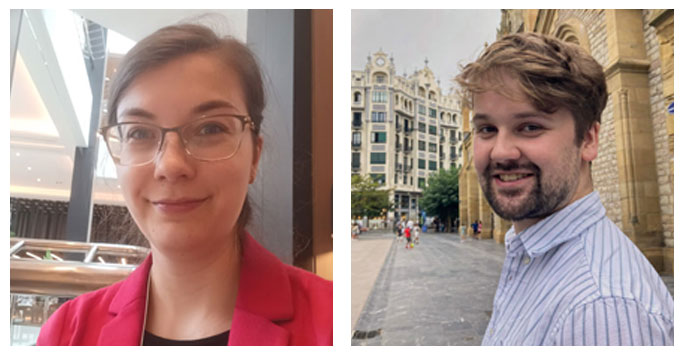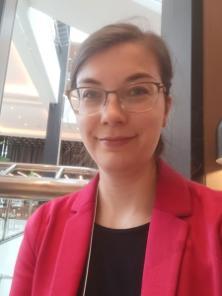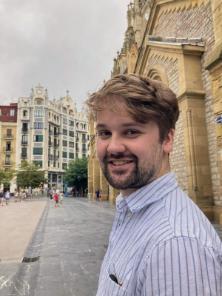
The Faculty of Humanities and Social Sciences is pleased to welcome two new British Academy Postdoctoral Fellows, Drs Hillary Burlock and David Addison, both of whom will be based in the Department of History. Learn more about them and their research here.
Dr Hillary Burlock
 My name is Hillary Burlock (she/her), and I completed my PhD in History at Queen Mary University of London under the supervision of Amanda Vickery in 2022. My PhD focused on the intersection between dance and politics in the late eighteenth century. After that, I was a Research Associate at Newcastle University, working on the Eighteenth-Century Political Participation and Electoral Culture (ECPPEC) project, and a Historic Interpreter at Historic Royal Palaces.
My name is Hillary Burlock (she/her), and I completed my PhD in History at Queen Mary University of London under the supervision of Amanda Vickery in 2022. My PhD focused on the intersection between dance and politics in the late eighteenth century. After that, I was a Research Associate at Newcastle University, working on the Eighteenth-Century Political Participation and Electoral Culture (ECPPEC) project, and a Historic Interpreter at Historic Royal Palaces.
During my PhD, I held fellowships at the Huntington Library, Royal Archives, and Lewis Walpole Library, and I currently hold a fellowship from the Houghton Library at Harvard University.
I have recently published in the Journal for Eighteenth-Century Studies and London Journal and am currently co-editing a collection of essays with Robin Eagles and Tatjana Le Boff on the cultural influence of Bath’s Assembly Rooms with Routledge.
My British Academy Postdoctoral Fellowship funds a monograph and digital history project tracing the development of British assembly rooms from 1660 to 1880. Liverpool’s Wellington Rooms, famously opened by the Duke of Wellington (1815), sits derelict and deteriorating. Its presence on the Heritage at Risk register drives my project to document, digitally map, and recover their histories, illuminating the importance of assembly to British identity and leisure culture. The project provides opportunities to collaborate with the Heritage Institute, Digital Humanities & Social Sciences theme, and the Digital Innovation Facility at the University.
Dr David Addison
 I am an incoming British Academy Postdoctoral Fellow, working on my new project: ‘The Making of Atlantic Christianity: Asceticism and Organisation in Far-Western Europe, AD 300-900’. I grew up just outside of Leeds, in West Yorkshire, and did most of my studies in Oxford (with a Masters year in Edinburgh)—so, coming to Liverpool feels a bit like a northern homecoming, albeit on the other (rainier!) side of the Pennines.
I am an incoming British Academy Postdoctoral Fellow, working on my new project: ‘The Making of Atlantic Christianity: Asceticism and Organisation in Far-Western Europe, AD 300-900’. I grew up just outside of Leeds, in West Yorkshire, and did most of my studies in Oxford (with a Masters year in Edinburgh)—so, coming to Liverpool feels a bit like a northern homecoming, albeit on the other (rainier!) side of the Pennines.
I am a social and cultural historian of religion in the period now known as late antiquity—that is, the pivotal time of transition between the ancient and medieval worlds. Though this is usually studied within a Mediterranean geographical frame, I am presently more interested in the Atlantic regions of Europe, which have too often been dismissed as atypical peripheries of the larger, better-studied polities of the era.
By looking from the (perceived) margins, I believe that I can revise received ideas on the nature and development of such fundamental Christian institutions such as the monastery, the parish, and the diocese, decentring the importance of the Roman administrative inheritance, and refocussing on the more personal and informal means by which new ways of life and structures of authority developed.
As a graduate student, my research focussed initially on the Iberian Peninsula. My doctoral work focussed on the social history of lay religiosity, and developed, in part, into a study of the role of distinctly ethical (rather than legal, canonical, or political) thought in the construction and contestation of a newly Christian society.
The fruits of this will be in my forthcoming monograph, Ethics and Institution: The Church in Late Antique Hispania, c. 500-711. My new project builds on this Iberian background, while expanding northwards, from familiar territory in modern-day Portugal, Galicia, and the Basque Country, to Aquitaine, Brittany, and the Insular world, reaching as far as Ireland and Iona in the north.
I maintain interdisciplinary interests in Philosophy and Anthropology am looking forward to meeting new colleagues and interlocutors from across the School of Histories, Languages, and Cultures, and beyond.